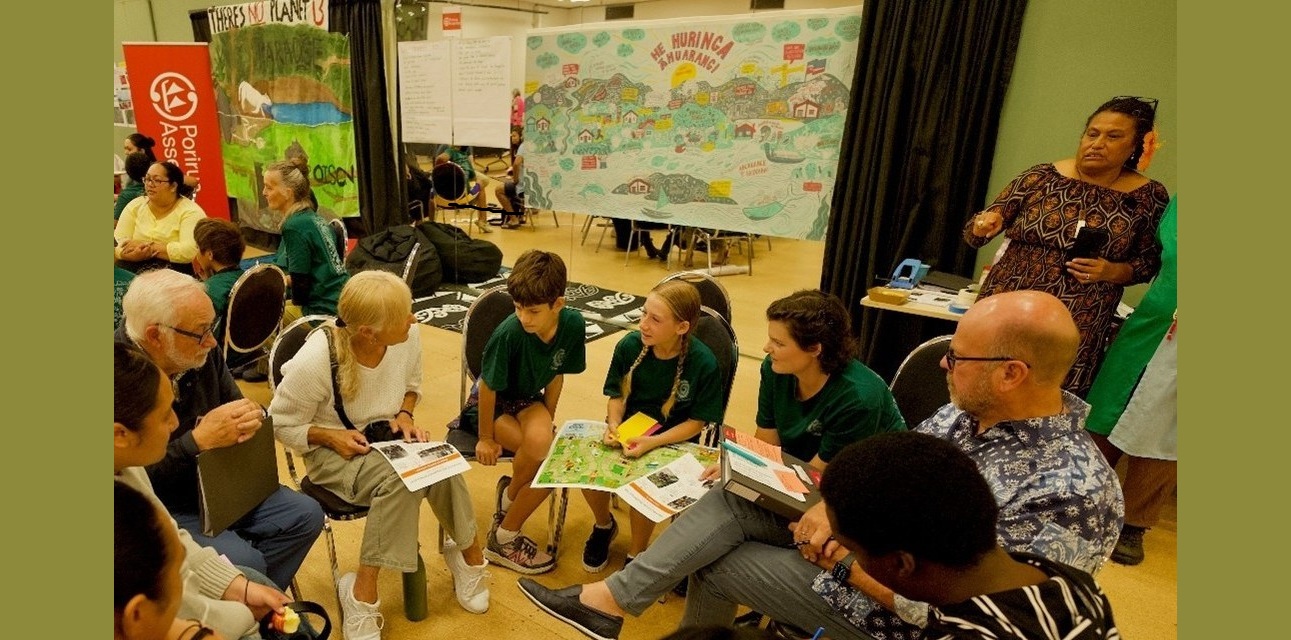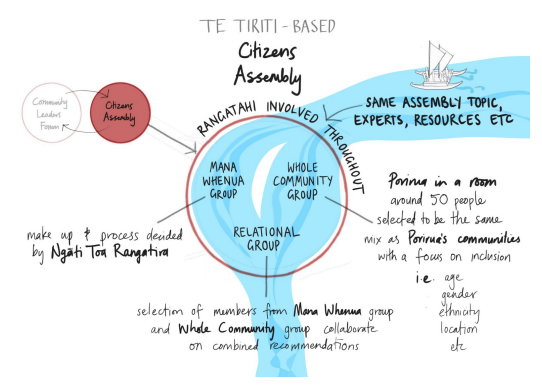
A community group, made up of approximately 50 randomly selected Porirua people sat alongside a mana whenua group convened by Ngāti Toa Rangatira. Both groups heard from local and subject matter experts, and considered the question:
Learning to live in Porirua’s changing world together. How do we connect and respond as our climate changes?
Doing democracy better
This Porirua Assembly on Climate is an expression of ideas which bring together the principles of deliberative democracy and our evolving understanding of how we can live out Te Tiriti o Waitangi.
Like the Methodist Church over 40 years ago, we have adopted the idea of Aotearoa as a nation made up of tangata whenua – the people who belong here because of whakapapa to the land - and tangata tiriti – the people who belong here because of the promises spelt out in Te Tiriti o Waitangi.
We are also putting into practice the principles of deliberative democracy, which are being picked up and developed all over the world. Everyday people, representative of their community, are randomly selected, and asked to consider a question, often complex and difficult, and which has been hard to deal with in other settings.
The evolution of the Citizens’ Assembly
This event has been in the making since November 2019. Back then, a group of us formed Te Reo o Ngā Tāngata/The People Speak (TPS), to try and ensure Te Tiriti was included in building a citizens’ assembly on climate. Early in 2021, Te Rūnanga o Toa Rangatira and Te Reo o Ngā Tāngata/The People Speak (TPS) met to share their aspirations for a better future. Their visions aligned, and so began a collaboration to develop Te Tiriti o Waitangi-based deliberative democracy for Porirua; to address in the first instance the climate crisis. The vision involves everyday people participating fully in decision-making and being able to develop recommendations that are widely supported in response to what’s happening locally.
Community-led from the outset
Co-design with the Porirua community was the approach from Day One. Ngāti Toa Rangatira and TPS agreed that a gathering of Porirua community leaders was needed to connect the incredible work being done by local groups, and being led by local people. This group is hosted by Ngāti Toa Rangatira and is now known as the Porirua Community Leaders Forum (PCLF). PCLF has been meeting four times a year since 2022. Membership is self selected, open and growing. The PCLF became the host of this first Porirua Assembly and received the recommendations by the Assembly, along with local and regional government.
Our Porirua Assembly used a Te Tiriti o Waitangi framework - a first for Aotearoa as far as we know. The Whole Community Group was made up of around 50 everyday Porirua people, representing the same mix of age, ethnicity, place of residence etc as we find in the wider community.
Given the number of Porirua’s people who are younger, and the future-orientation of the question, we agreed that this Assembly would be made up of people 15 years and over. The Whole Community Group had around 20 percent each of people who identify as Māori, and as Pasifika, as is found in Porirua.
At the same time as the Whole Community Group met, Ngāti Toa Rangatira convened a group of their people - the Mana Whenua Group. Both groups addressed the same question, and heard from most of the same experts.
Rangatahi representation
Before the Assembly convened, a group of around 50 young people from all the schools in Porirua, met for a Wānanga Rangatahi. The focus of the second day of the Assembly was to hear from that wānanga – with around 20 rangatahi turning up to lay out in song, poetry, art and oratory their passion about the climate crisis, and their demand to be heard and involved in Porirua.
The response to this challenge is a whole section of the Assembly Recommendations on Rangatahi - calling for schools to offer education about Climate Change and sustainability, for space in Porirua for a Porirua Youth Council and seats around the Council table for young people, and for support of the “Make it 16” campaign. A new movement - Future Unity - has grown out of this rangatahi group, reaching out to even more young people in Poirua.
Towards the end of the Assembly process, both the Whole Community and Mana Whenua groups met together as a Relational Group, to share their deliberations, and what were emerging as recommendations. The Relational Group developed a shared list of recommendations as the findings of the Porirua Assembly on Climate.

Wider engagement and total transparency
Before the Assembly began, Porirua City Council and Greater Wellington Regional Council each formally agreed how they will receive the recommendations that come out of the Porirua Assembly. They have committed to an open process, within a set time frame, so that everyone can see what is going to happen, what is not going to happen, and if not, why not.
From the start, our commitment has been to run an open and transparent process. We have in place formal evaluation processes, and we are now working on an Open Source Toolkit so others can see what we did and what we learned.
The introduction of the Recommendations is a stirring affirmation that “the mauri of Porirua is thriving”, and that “we of Porirua are part of a living ecosystem.” There are six groupings of Recommendations – Rangatahi (Youth), Te Taiao (Our Environment), Approach and Implementation, Resilient People Networks, Action through Education and Awareness, and Resilient Infrastructure.
The Assembly Recommendations did not focus on many specific technical issues, but registered strong general support for initiatives such as native reafforestation, manufacturer responsibility for waste disposal, climate planning in property development, free or subsidised rubbish bags, expanded access to renewable energy, and improved public transport.
The overall message was clear – the Porirua community is up for seriously addressing how to respond to future changes in our climate - through widespread education and awareness, so all the people of Porirua understand what part they can play. The community and iwi-led basis of the Assembly is reflected in Recommendations that call for “whole of community” actions, not relying solely on local or central government initiatives.
Again and again, the Recommendations note the actions that Ngati Toa Rangatira – Mana Whenua in Porirua – will be taking, and the vision of the whole Porirua community working together. “… an evidence-based, community-informed, iwi-led action plan, ensuring present and intergenerational commitment from everyone with skin in the game in Porirua.”
Assembly organisers and community leaders all recognise that this Assembly is just the start of ongoing work in Porirua. Already, some Assembly participants have met again, to set priorities for their Recommendations, and to think about accountability – how can we tell if we are getting somewhere? The refined Recommendations, which are focused on 'whole of community actions', have been presented to the Porirua Community Leaders Forum, to the Porirua City Council and Greater Wellington Regional Council. It is expected that the PCLF, which meets quarterly, will help carry forward the Recommendations.
The MCNZ connection
So, what was the contribution of Te Hāhi Weteriana o Aotearoa to this historic process and event? There was my personal role as Co-Chair of The People Speak. As a lifelong part of our Church and its bicultural journey, I saw how this model of working would enable the power-sharing dynamic we set in place in our own commitment in 1983.
I am also Chair of Wesley Community Action (WCA), the Church’s community development and social service agency here in greater Wellington. WCA has three physical bases in Porirua – in Waitangirua, Cannons Creek, and the CBD – and a wide range of community-led programmes working with young people, with families, with food security and financial literacy, with environmental initiatives, and with the club [gang] communities. WCA people became active participants in the creation of the Porirua Community Leaders’ Forum. And one of our senior staff – Makerita Makepelu – became the co-facilitator of the Assembly itself.
For us in WCA, this Assembly fits perfectly with our ongoing work to support Porirua becoming a more engaged, responsive and active community. It is a living example of the words we treasure from the Church’s ex-President, Rev Rua Rakena - Kaore mā te waha engari mā te ringa. Actions speak louder than words.
Watch: Ngāti Toa holds first citizens' assembly